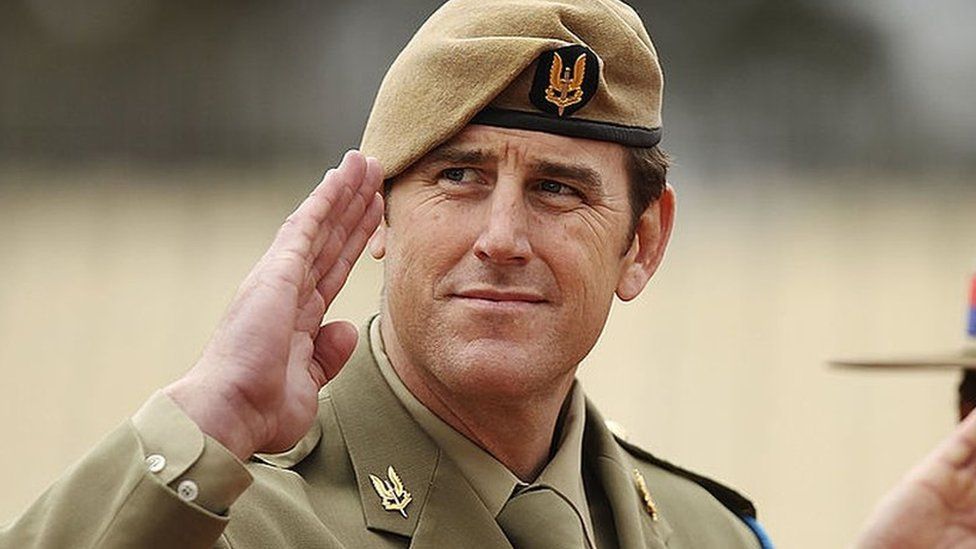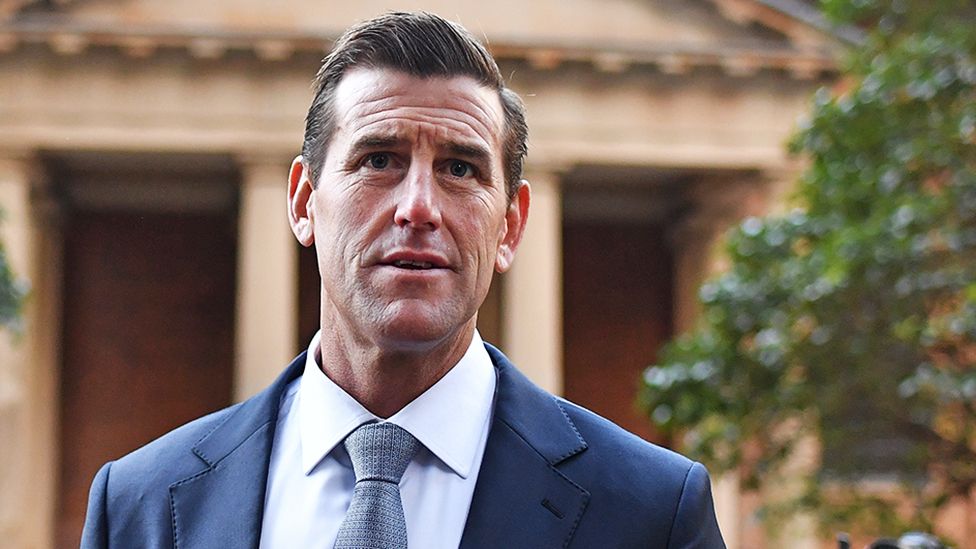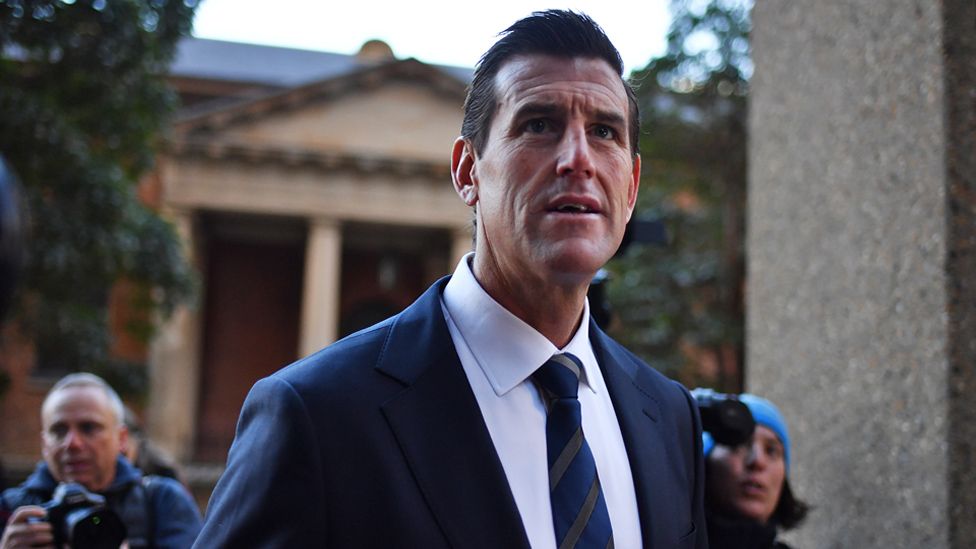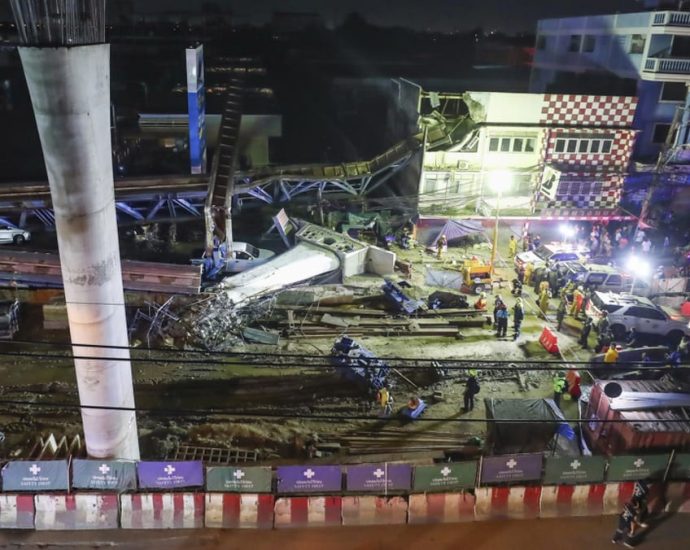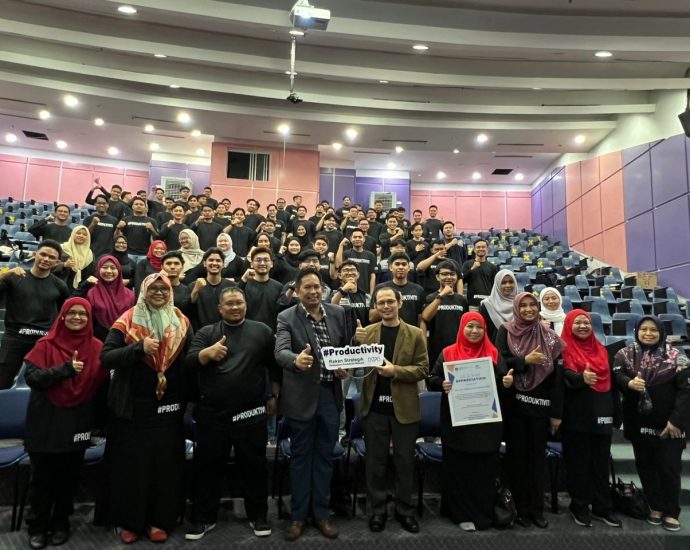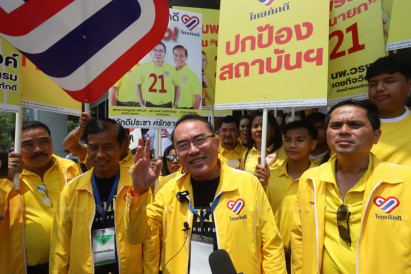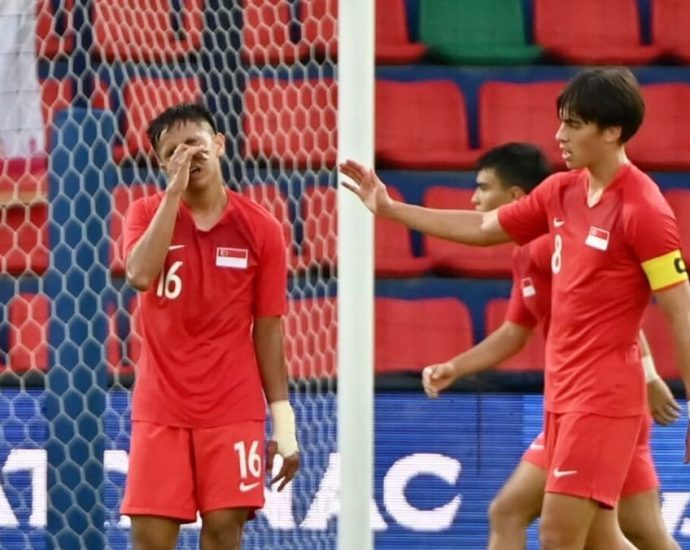Ben Roberts-Smith: Australia’s top soldier appeals over war crimes defamation trial
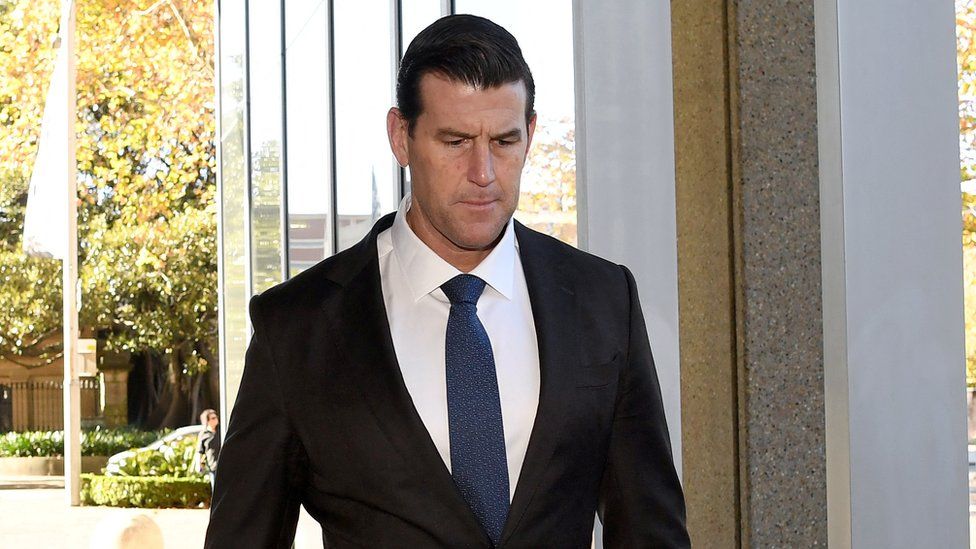 Reuters
ReutersAustralia’s most-decorated living soldier Ben Roberts-Smith is appealing against a landmark defamation judgement which found he committed war crimes.
A judge last month ruled articles alleging the Victoria Cross recipient had murdered four Afghans were true.
It was the first time in history any court has assessed claims of war crimes by Australian forces.
Mr Roberts-Smith is not facing criminal charges and maintains his innocence. His grounds for appeal are unknown.
The former special forces corporal sued three Australian newspapers over a series of articles alleging serious misconduct while deployed in Afghanistan between 2009-2012 as part of a US-led military coalition.
At the time the articles were published in 2018, Mr Roberts-Smith was considered a national hero, having been awarded Australia’s highest military honour for single-handedly overpowering Taliban fighters attacking his Special Air Service (SAS) platoon.
The 44-year-old claimed the papers ruined his life with their reports that he had broken the moral and legal rules of war.
His defamation case – dubbed by some “the trial of the century” – lasted 110 days and was rumoured to have cost up to A$25m ($16.3m; £13.2m).
On 1 June a Federal Court judge threw out the case against The Age, The Sydney Morning Herald, and The Canberra Times, ruling it was “substantially true” that Mr Roberts-Smith had murdered unarmed Afghan prisoners and civilians and bullied fellow soldiers.
Justice Anthony Besanko also found that Mr Roberts-Smith lied to cover up his misconduct and threatened witnesses.
Additional allegations that he had punched his lover, threatened a peer, and committed two other murders were not proven to the “balance of probabilities” standard required in civil cases.
Mr Roberts-Smith, who left the defence force in 2013, has not been charged over any of the claims in a criminal court, where there is a higher burden of proof.
None of the evidence presented in the civil defamation case against Mr Roberts-Smith can be used in any criminal proceedings, meaning investigators must gather their own independently.
But the case has raised the spectre of a possible wider reckoning over claims of war crimes by Australian forces.
In 2020, a landmark investigation known as the Brereton Report found “credible evidence” that elite Australian soldiers unlawfully killed 39 people in Afghanistan.
It recommended that 19 current or former soldiers should be investigated over alleged killings of prisoners and civilians from 2009-13.
Australian troops were deployed to Afghanistan between 2001 and 2021, as part of a US-led coalition that ousted the Taliban after the 11 September 2001 attacks in the United States. The Taliban retook control of Afghanistan in 2021.
Related Topics
SocGen announces new Asian leadership roles | FinanceAsia

Paris-headquartered Société Générale has announced via media note two newly created leadership appointments within its global banking and advisory businesses.
In addition to her role as head of Corporate Coverage for Southeast Asia, Singapore-based Eliza Ng becomes head of Global Banking and Advisory for the Southeast Asian region; meanwhile, Kanta Murata takes on responsibility for Japan as market leader of Global Banking and Advisory, alongside his current capacity as Japan head of Corporate Client Coverage and deputy branch manager of the bank’s Tokyo office.
Effective from the end of June, the appointments mark the bank’s continued commitment to strengthen its local capabilities to support clients in local markets, the release detailed.
In their new roles, the pair will supervise all global banking and advisory endeavours, excluding business related to the bank’s institutional and debt capital markets (DCM) efforts. They both report regionally to Stephanie Clement de Givry, head of Global Banking and Advisory for Asia Pacific; and to Olivier Vercaemer, her deputy.
Ng and Murata shared with FinanceAsia their priorities as they settle into their new functions.
“My priorities revolve around three main areas: customer-oriented approach; regulatory compliance and credit risk management; and growth, especially across ESG-related aspects,” said Murata.
He emphasised his work to enhance client experience through expertly structured finance arrangements to meet evolving market needs, while prioritising robust risk management practices to ensure the security and stability of the bank’s operations.
The ESG arena is another area where he targets expansion. “To stay competitive and relevant in a rapidly evolving ESG landscape, it is essential to embrace innovative approaches,” he explained.
Ng agreed that ESG is embedded in the bank’s business and is a focus for the regional teams.
“My immediate priority is to leverage the expertise and capabilities that our expanded franchise can offer our clients in the Southeast Asia region,” she said, adding that she looks forward to continuing to accompany clients on their energy transition aims.
This effort, she explained would complement and further support development across the region’s emerging economies.
Ng added that such regional sustainability efforts are bringing with them new business opportunities across several segments, “including the transportation value chain and new technologies in the renewable energy sector.”
Murata also observes a trend towards decarbonisation across Japanese activity.
“According to the latest preliminary figures as of 1Q23, the Bank of Japan’s “Flow of Funds” [demonstrate that] the loan balance of private non-financial corporations has been steadily growing during past quarters; partly driven by economic recovery, capital expenditure, and ESG-related investment opportunities.”
He said that this growth opportunity is further supported by the Japanese government’s push for carbon neutrality by 2050, which will require more than JPY150 trillion ($1 trillion) in investment from public and private sectors over the next ten years.
In terms of landmark deals, both Ng and Murata have been involved in a number of the bank’s key transactions.
Murata pointed to his involvement in an accelerated bookbuild for a Japanese client that saw the bank organise a block trade so it could divest European stocks; meanwhile, Ng highlighted the bank’s role across Temasek Financial’s EUR 1.5 billion ($1.65 billion) four and ten-year dual tranche senior unsecured bonds, earlier this year.
¬ Haymarket Media Limited. All rights reserved.
Dismembered body of missing German businessman found in freezer of a home in Thailand
BANGKOK: The dismembered body of a 62-year-old German businessman who has been missing for a week has been found in the freezer of a house in southern Thailand, police said on Tuesday (Jul 11). Chief of police in the town of Nong Prue Tawee Kudthalaeng said the body of Hans-Peter MackContinue Reading
Death toll rises in collapse of under-construction Bangkok highway
Wisanu Subsompon, deputy governor of Bangkok, told a press conference on Tuesday the damage may have been caused by an unbalanced crane. “Work will be suspended until they have a safety plan,” he said. The roadwork is part of a project to build elevated highways in an attempt to easeContinue Reading
How are Chinese manufacturers coping with a slow post-COVID recovery amid weak external demand?

PUTTING THE PANDEMIC BEHIND
This comes as companies sought to diversify their supply chains away from China, when there had been no end to the country’s zero-COVID policy in sight. Trade tensions with the United States have also raised concerns among businesses.
Online logistics platform Container xChange founder Christian Roeloffs has observed a significant number of excess containers at China’s ports.
Mr Roeloffs said price is not the only factor in his business decisions.
“If I deal with an export country, where I can’t rely on politics to create a climate or an environment for reliability, but the politics that creates a climate of sort of severe restrictions of ongoing production, then I’m more inclined to move to more reliable alternatives,” he said.
Observers pointed to other challenges that lie ahead, as the world’s second-largest economy tries to put the COVID-19 pandemic behind it.
Malaysian Productivity Corp and UiTM introduce productivity module for final semester students
65 students from the elective final year took the course
Is one of the modules for students in the faculty of Mechanical Engineering
The Malaysian Productivity Corporation (MPC) developed a new productivity-related module to strengthen students’ knowledge in achieving the government’s agenda to increase the nation’s productivity.
The new module is a collaboration between…Continue Reading
Appeal Court also rejects Pannika’s suit against Warong

The Appeal Court has upheld a lower court’s dismissal of a defamation lawsuit brought by Progressive Movement core member Pannika Wanich against Thai Pakdee Party leader Warong Dechgitvigrom over remarks alleging misuse of public donations.
The decision was read out at the Criminal Court on Tuesday.
Ms Pannika, executive of the Progressive Movement, accused Dr Warong of defaming the movement.
The lawsuit related to remarks alleging misuse of public donations to help artists affected by the closure of businesses and leisure activities during the Covid-19 lockdown. Dr Warong contested the charge.
The Criminal Court earlier dismissed the lawsuit on the grounds the defendant’s comments had been honest criticism. Ms Pannika appealed the decision.
The Appeal Court upheld the lower court’s ruling,saying Ms Pannika was a public figure and Dr Warong expressed his honest opinion. The court also dropped the lawsuit.
Dr Warong was present at the court. He said the suit was brought by people who wanted to amend Section 112 of the Criminal Code, known as the lese majeste law. The suit was filed to silence his criticism and opposition toi the move. He said his opponents should come out and fight the issue openly and fairly.
Dr Warong said he had faced three lawsuits – filed by Move Forward Party leader Pita Limjaroenrat, Progressive Movement leader Thanathorn Juangroongruangkit, and Ms Pannika. Courts had already dismissed the suits filed by Mr Pita and Ms Pannika, leaving only the case brought by Mr Thanathorn.
The Thai Pakdee leader asked Mr Thanathorn to withdraw the suit to avoid wasting time. He was confident Mr Thanatorn would lose in court.
Singapore men’s under-22 football team will not take part in Asian Games

SINGAPORE: Singapore men’s under-22 football team will not participate in the upcoming Hangzhou Asian Games, the Football Association of Singapore (FAS) said on Tuesday (Jul 11).
This decision comes after a review of the team’s Southeast Asian (SEA) Games performance and scheduling conflicts, said FAS.
Last Friday, the association unveiled 10 recommendations to improve the country’s performance at future SEA Games, after the team was knocked out of the group stages for the fifth straight time.
The Young Lions also suffered a 7-0 mauling by Malaysia in their final group game in May, making it Singapore’s heaviest defeat at the SEA Games since it became an age-group affair in 2001.
The decision not to take part in the upcoming Asian Games is in line with one of the recommendations from the review, said FAS.
The under-22 team will focus on the SEA Games and the 2024 Asian Football Confederation (AFC) under-23 Asian Cup qualifying tournament.
FAS said the Asian Games falls outside the FIFA window and takes place in the same month as the 2024 AFC under-23 Asian Cup qualifiers.
Sport Singapore supports the decision and the Singapore National Olympic Council has no objections to the team not taking part in the Asian Games, said FAS.
The last time the Yong Lions took part in the Asian Games was in 2014. They did not meet the benchmark for the 2018 Asian Games.
Mr Bernard Tan, acting president of the FAS, said: “The past few weeks, the FAS has gone through a period of introspection, and we are right now in the midst of implementing the recommendations from the recent SEA Games review.”
FAS general secretary Yazeen Buhari said the association considered the preparation time required to get the team ready for each tournament, and took into account the players’ commitments to their clubs, schools and National Service.
“Given that the Asian Games comes off the back of the AFC under-23 Asian Cup qualifiers, this makes participation particularly challenging,” he added.
Singapore women’s team will continue to participate in the Asian Games, which was postponed from September 2022 because of the COVID-19 pandemic.
Five key watchpoints for the NATO summit
Leaders of the nations comprising NATO will meet for a two-day summit beginning on July 11, 2023.
The gathering in the Lithuanian capital, Vilnius, comes at a pivotal moment for the Western security alliance – it is seeking to expand membership and confront challenges ranging from the ongoing war in Ukraine to a perceived growing military threat from China.
No doubt NATO members will want to present a united front at the meeting. But on a number of key issues, not everyone is in agreement. Here are some of the issues likely to be discussed and debated during the leaders’ summit.
1. A pathway to Ukraine membership?
With war in Europe the obvious backdrop to the summit, much talk will be about Ukraine. NATO members have been aiding Kyiv individually, through the supply of arms and aid. And the military alliance has been assisting through nonlethal support, such as medical supplies and training.
But, as noted by Mark Webber, professor of international politics at the UK’s University of Birmingham, what many in Kiev really want is full membership: “The bigger prize for Ukraine, however, is NATO membership. That would bring the country within the collective defense provisions of Article 5 of the North Atlantic Treaty and, in effect, extend US – and UK – nuclear guarantees to Ukrainian territory.”
Webber noted that accommodating Ukrainian President Volodymyr Zelenskyy’s request for “expedited” membership of the alliance will be difficult. “No one in NATO is arguing in favor of granting membership while Ukraine remains at war. Beyond that, the allies are divided.”
2. What about Sweden?
The NATO leaders’ summit will be the first at which the members present will include Finland, which joined in April. Fellow Nordic state Sweden is hoping to be next, perhaps even officially becoming the group’s 32nd member at the Vilnius meetup.
Sweden’s ascension had been held up by NATO member Turkey. Turkey’s recently reelected leader, Recep Tayyip Erdogan, had previous blocked the bid due to what he saw as the Swedish government’s reluctance to crack down on Kurdish “terrorists” being “harbored” in Sweden.

But on the eve of the Vilnius summit, it was announced that Erdogan had agreed to forward Sweden’s bid to the Turkish parliament for ratification.
Ronald Suny, a historian at University of Michigan, noted that Erdogan’s reluctance to allow Sweden and Finland entry represented domestic concerns – international pressure on the Kurdistan Workers’ Party, or PKK, fits his agenda of suppressing Kurdish rights in Turkey. But it also highlights an underlying problem the alliance is facing:
“NATO is supposed to be an alliance of democratic countries. Yet several of its members – notably Turkey and Hungary – have moved steadily away from liberal democracy toward ethnonational populist authoritarianism,” Suny wrote.
“Finland and Sweden, on the other hand, fulfil the parameters of NATO membership more clearly than several of the alliance’s current members. As the US proclaims that the war in Ukraine is a struggle between democracy and autocracy, Turkey’s opposition to the Nordics who have protested its drift to illiberalism are testing the unity and the ideological coherence of NATO.”
3. The benefit of being a NATO member
But why would Finland, Sweden, Ukraine and any other country look to join NATO? John Deni at American University School of International Service explained that Article 5 of the alliance’s treaty calls for collective action should any member be attacked.
“Article 5 really is the heart and soul of the NATO alliance. It is the part of the treaty that says that if one member is attacked, then all of the other members will treat it as an attack on them all. In effect, it calls for a collective response once requested by any of the current 30 members of NATO and invoked by the entire alliance,” he wrote.
But that doesn’t necessarily mean that the US would have to mount a military response should an ally be attacked. “Article 5 was written in such a way that it allows each ally to decide for itself the best course of action to take – there is no prescribed response once the article is invoked,” Deni added.
4. The end of the neutral option?
As Finland’s and Sweden’s desire to join NATO shows, smaller nations traditionally seen as aspiring to neutrality are, in the words of University of Michigan’s Ronald Suny, “recalculating how they fit into this renewed division of the world.”
Suny noted that, with Finland’s entry into NATO and the now high chance of once-neutral Sweden joining it, other states are questioning “the efficacy of nonalignment in a polarized world.”
“In its place, we have the ‘NATOfication’ of Eastern Europe – something that Putin unwittingly accelerated and which leaves Putin’s Russia with less accommodating neighbors,” Suny wrote.
5. A cluster bomb controversy
A last-minute area of controversy emerged as NATO leaders prepared to gather in Vilnius: cluster bombs.
On July 7, 2023, the Biden administration announced that it would supply Ukraine with the controversial munition, which scatters bomblets across a wide area. The problem is not all NATO countries are in agreement with the US move.

Germany, the UK and Canada – which are among the 120-plus countries that have signed an international treaty banning the use of cluster bombs – have all already expressed their misgivings.
Robert Goldman, a laws of war expert at American University, explained that the White House had previously shown hesitancy over selling cluster bombs to Ukraine in part because of the “optics” and over concerns that “it may introducing a wedge between the U.S. and other NATO countries.”
Goldman explained that there is no law preventing the US from providing cluster bombs to the Ukraine or any other country.
“Nonetheless, providing Ukraine with cluster weapons could serve to destigmatize them and runs counter to international efforts to end their use. And that, in turn, could encourage – or excuse – their use by other states that may be less responsible,” he argued.
Matt Williams, Senior International Editor, The Conversation
This article is republished from The Conversation under a Creative Commons license. Read the original article.
King of the Big Stomach: Chinese eatery in trouble over dumpling-eating race
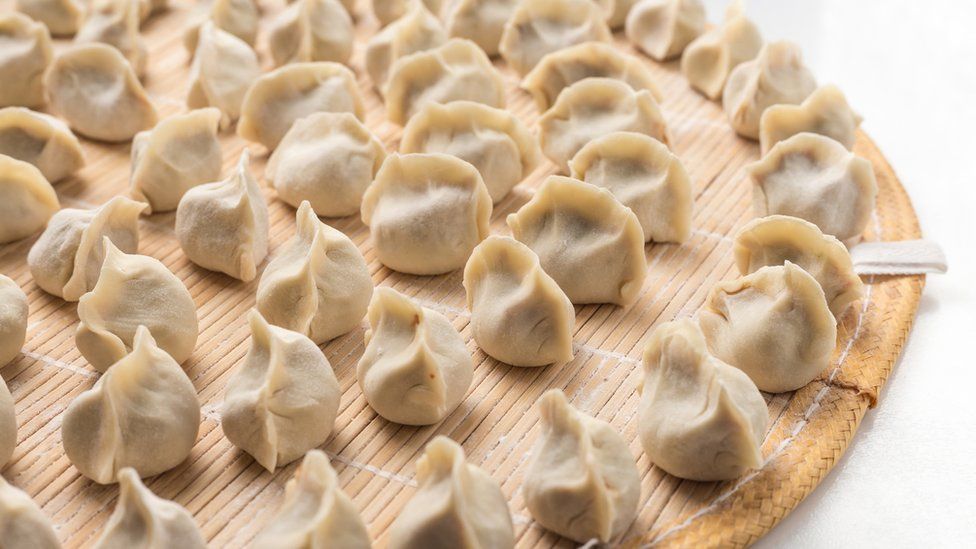 Getty Images
Getty ImagesChina is investigating a restaurant over a dumpling-eating contest that allegedly flouts anti-food waste laws.
Those who finish 108 spicy dumplings at the fastest time win a free meal and the title “King of the Big Stomach”.
But the viral challenge has “misled” people into ordering excessively, resulting in wastage, authorities say.
China enacted laws in 2021 to tackle what leader Xi Jinping described as a “shocking and distressing” squandering of food.
Two years on however, people are still adjusting to the regulations. After all, China is a country where hosts offering more food than their guests can stomach is regarded as a form of hospitality.
At least 34 million tonnes of food are wasted in Chinese restaurants every year, according to a 2020 survey conducted by China’s national legislature.
The eatery in Sichuan province is one of several under investigation for violating the laws.
A hotel in Fujian province is also being investigated over a contest last March that challenged participants to finish a 3kg burger in 30 minutes.
Eateries that “induce or mislead customers to order excessively to cause obvious waste” can be fined. Businesses can also collect a waste disposal fee from customers who leave large amounts of leftovers on their plates.
China also banned the livestreaming of binge eating and competitive eating. Many online accounts that feature such eaters have been shut down.
Some Chinese internet users have criticised the authorities’ recent investigations on restaurants as an overreach.
“Why is this an issue policed by the government? Must it be?” a user wrote on China’s micro-blogging platform Weibo.
“It would be better for the authorities to pay greater attention to food safety issues,” another wrote on video-sharing app Douyin.
Several local authorities and individual eateries have also laid down their own policies to support the crusade against wasted food.
For example, the Wuhan Catering Industry Association urges restaurants in the city to follow a system where groups must order one dish less than the number of diners.
Some restaurants even weigh customers before their meals to determine how much food they should be given.
Related Topics
-
-
20 August 2020

-
-
-
13 August 2020

-


